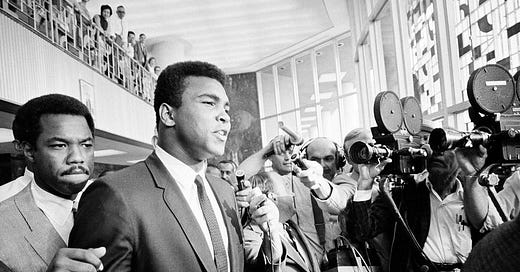What Would Ali Do?

As a part of my reflections this week amidst the protests, I decided to revisit a book I read last summer entitled “Ali: A Life.”
Just stumbled upon this in the book’s epilogue and thought I’d share it.
—
Five months after Muhammad Ali’s death, a political activist from the 1960s sat in a coffee shop on Chicago’s South Side and told this story: In the summer of 1966, Martin Luther King Jr. had come to Chicago, planning to put the city at the center of his ongoing, nonviolent revolution. He called it the Chicago Freedom Movement, and the main focus was an attack on discriminatory housing.
Dr. King led marches into all-white neighborhoods, where he faced vicious attacks by mobs. He also organized a rent strike, urging tenants in derelict buildings to put their monthly rents into a special trust fund instead of paying it to their landlords, and vowing that the money would be used for badly needed home repairs.
One day, one of the volunteers in the movement got word that a family participating in the rent strike was being evicted from a home in the Garfield Park neighborhood. The volunteer, a young woman enrolled in law school at the University of Chicago, hurried to the scene. As she arrived, officials from the Cook County Sheriff’s Office were emptying the family’s apartment, cluttering the sidewalk with furniture, clothing, books, and family photos.
The day was hot and humid. Hundreds of people lined the street, watching the eviction in progress. As the young woman stood and stared, helpless, she felt a hand on her shoulder. She turned around and looked up. It was Ali.
Until then, she had seen him only on television. He was wearing a beautiful blue seersucker coat, and he was gorgeous. He removed his coat and asked the young woman to hold it. Ali was facing draft-dodging charges at the time, but he had not yet been barred from boxing. In fact, he was at his athletic peak: twenty-four years old, too fast to be hit, too strong to be resisted, as perfect a boxer as the world had ever seen.
Although he had spent much of the summer in Chicago, he had not marched with King during the Chicago Freedom Movement nor commented publicly on the protest. How had Ali heard about the eviction? Why was he there? Had he stumbled across it by accident? Had someone called him? There were no reporters on hand to ask him, and no cameras to capture what happened next.
Without saying a word, Ali walked to where the family’s belongings had been dumped on the sidewalk, picked up a kitchen chair, and carried it back into the apartment. The sheriff’s deputies made no move to stop him. Within seconds, dozens of people followed Ali’s lead. Soon, the apartment was full again. Ali took back his jacket, got in his car, and drove away.



